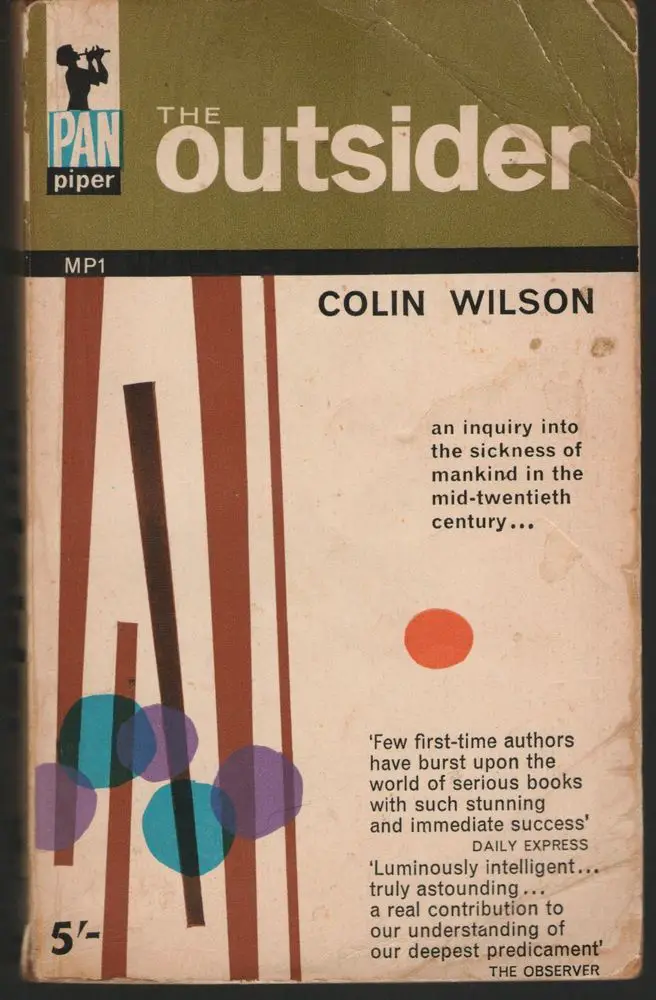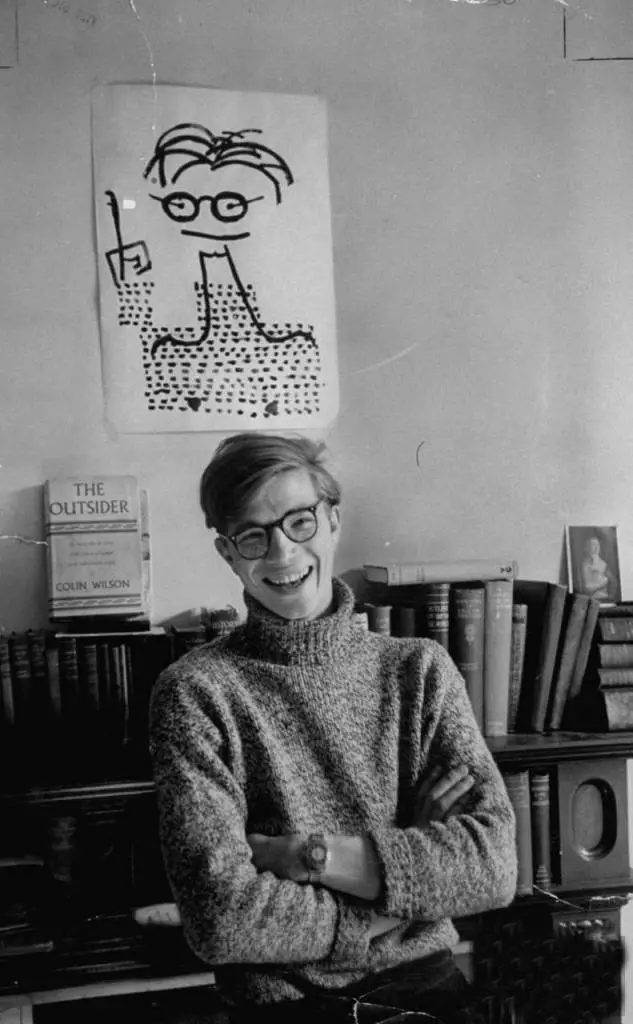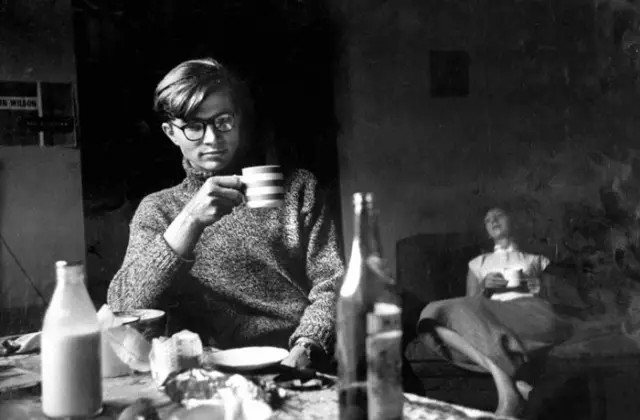There are men for whom, at a certain point, reality ceases to be the rational design that everyone claims to see: they are what Colin Wilson called the "Outsiders", able to see behind the veil of appearances, "too much and Too far".
di Nicholas Joy
article originally published on Minima & Moralia
In the winter of 1954, a twenty-three-year-old English writer, alone and penniless, conceived the book that would make him famous. His name was Colin Wilson, he had moved to London from Leicester, and after spending the summer nights in a sleeping bag in Hampstead Heat to save money, with the first colds he had found refuge in the reading room of the British Museum.
Here he wrote novels that were incapable of relieving him of the condition of poverty in which he had placed himself. It was a hard life. But it was also an adventurous life. He would be wronged by saying that Wilson revered the great irregular people who lived between the nineteenth and twentieth centuries like Emma Bovary the characters of the appendix novels. But only a angry young man convinced that he was drawing inspiration from the extreme heroes of Knut Hamsun, he could find himself, on Christmas day, nibbling canned tomatoes in a damp little room in Brockley (South London), with no company other than himself and his heart at peace.
To a bourgeois observer (at that time, in Europe, the attribute was not without significance) the situation would have seemed pathetic. But Wilson felt heroically alone like Dostoevsky's Raskolnikov or Rilke's Malte Laurids Brigge. So when the British reopened after the holidays, he went straight to the reading room and wrote the first pages of The Outsider.
They were the basis of a long and passionate essay that, digging into the biographies of writers, artists, philosophers capable of seeing "too much and too far", tried to offer new interpretations for the problem against which many of them had crashed (the terrible conflict between society and the individual), in the hope of scratching a much more dizzying and ancient mystery: what is our real self? and what is hidden behind the appearance of what - deceived by the sleep of the perceptive apparatus - we call the world?

The Outsider gave its author an exaggerated fame. It came out in 1956, the same year as Remember with rage by John Osborne. The media went wild, turning Osborne and Wilson against their will into operetta rebels. In Italy the book was published by Lerici in 1958 with the title The stranger (the word outsider was almost unknown in our country at the time) and finally returns - translation by Thomas Fazi - for the Atlantis editions in its original title.
One of the most fascinating aspects of The Outsider is that he tries to enter not so much into material lives, but into the minds and spirits (the inner biographies) of characters such as Friedrich Nietzsche, Fedor Dostoevskij, Vincent Van Gogh, Ernest Hemingway, Vaclav Nijinskij, TS Eliot, Georges Gurdjieff, Albert Camus… For these men, at a certain point, reality is no longer the rational design that everyone claims to see.
It is not clear whether what seemed like a known alphabet suddenly becomes a brutal hieroglyph with no more meaning (the world, to which the bourgeoisie tries so hard to give a shape, actually means nothing), or whether behind that indecipherable in turn conceal something further, which we would be able to grasp if we had the strength to make our life a true spiritual experiment, like the mystics and saints of the past.
THEoutsider he is thus the only one who "knows that he is sick in a society that does not know that he is sick." Out of the blue TS Eliot sees London as the unreal city populated by the dead souls of the Waste Land. Friedrich Nietzsche is struck by the vision of the eternal return walking all alone in the Engadine. What until a few moments before was everyday life, becomes unbearably nauseating for Sartre's Roquentin. And so on.

The damnation of the outsider it consists in being halfway between ordinary men and the truly elect. Sensitive enough to realize that life is not what it appears, they courageously manage to transform their own into a long and difficult adventure of the spirit. The problem is that they are not touched by the grace of the saints, just as they do not have the temper that leads to enlightenment Bodhisattva of the Buddhist tradition. They are not sleepers, but not total awakened ones either. This is why, not infrequently, society tears them apart.
In the latter part of his life, Van Gogh succeeds in stealing even a simple tree or chair from the domain of appearance (he finally manages to see them through his art), but this does not prevent him from firing a revolver shot. There is something supernatural about Frederic Harry's fresh manhood Farewell to Arms, as if its muscles are in contact with the Stoicism of 300 BC, but we know how its author ended up. While dancing, Nijinsky feels a god within him, and yet his possession is not stable enough not to drive him mad a few years later, as will happen for Nietzsche.
Few outsiders escape ruin. Colin Wilson gives the examples of Eliot and Dostoevsky, able to hold out until he resolves his own inner battle in the magnificent syntheses of Four quartets and Karamazov brothers. But reading The Outsider in 2016, there is a desire to project these arguments into the present.

We live in an era that neutralizes all forms of irregularities and makes them profit. Just follow a talent on tv to realize it. It is enough to travel on the surface of the water on the world of information to confirm how every discrepancy receives space as long as it is filtered by the codes (spectacle or conformity) that destroy its message. The guard is lowered for a moment, and an authentic vocation has already allowed itself to be transformed into a freak phenomenon.
Today “Outsider” could be a perfume brand. Yet there is a need for a radicalism that is the enemy of fanaticism, for a search for the transcendent that does not draw lymph from megalomania or thirst for power. We all, in our hearts, know the speech mainstream it is only making us poorer, unhappy, up-to-date, far from a life to which we recognize beauty and meaning. Yet - as Colin Wilson did at Christmas '54 - it would be enough to look the other way.

6 comments on “Colin Wilson: "The Outsider""